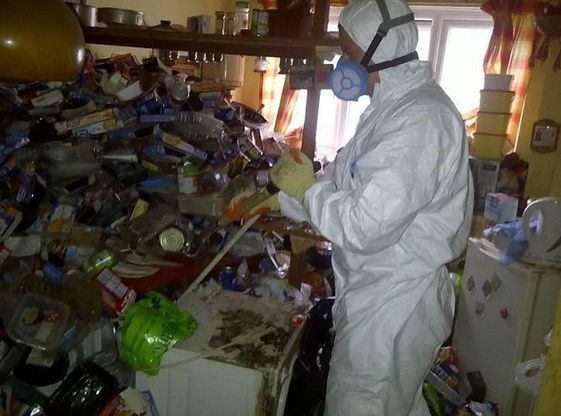

Signs & Behaviors of Hoarding Disorder in Seniors
What an 87-year-old man counted as decades of treasures—jumbled mounds of well-aged newspapers, crumpled clothes, decayed food, a broken toilet and a long-dead refrigerator—most would consider throwaway junk. But he continued to crawl around the chaotic piles in an apartment with no heat and shattered window panes, huddling most days in one sparse spot in his living room.
Until a developer wanted the elderly gentleman evicted.
Jack Sherratt, the Director of Project ORE, a geriatric and hoarding initiative through New York City’s Educational Alliance, advocated for the octogenarian in court. Sherratt, a clinical social worker, and his team compassionately train elderly persons with hoarding conditions to change their thought processes and habitual stashing—the 87-year-old is among one of their success stories.

Hoarding and Older Adults
Previously thought to be a subset of obsessive-compulsive disorder, hoarding was classified by the American Psychiatric Association in 2013 as a distinct psychiatric disorder. Not simply a tendency to be messy or unorganized, hoarding disorder is defined as a continual problem with discarding or parting with possessions in spite of their actual value. Commonly collected items include magazines, household supplies, cardboard boxes and old mail. Some individuals amass plastic bags, others keep taking in a menagerie of pets.
Age affects clutter and hoarder conditions because older adults have lived longer to accumulate possessions and mobility issues can slow proper cleanup. Right at Home of Lower Manhattan, owned by Albert Eshoo and Joyce Barocas, collaborates with Sherratt to offer continued education unit (CEU) hoarding workshops on how to help older adults keep their homes de-cluttered and safe.
Hoarding disorder is treatable with effective clinical strategies for minimizing the hoarding behavior and reducing clutter volume.
Common Signs and Behaviors of Hoarding
- Inability or unwillingness to discard accumulated possessions
- Intense anxiety over throwing away items
- Intensified difficulty in organizing possessions
- Functional loss of living space
- High risk for health and safety hazards
- Social isolation and marital strain
- Distress or embarrassment over cluttered items
- Suspicions of other people touching hoarded items
- Obsession over running low on an item or needing it in the future
One person’s hoarding issue can affect the whole community. Apartment managers worry about possible insect infestations or odors from renters who hoard. Fire departments bristle over a fire outbreak in a disheveled home spreading to neighboring properties. Family members grow frustrated, embarrassed or depressed by the stockpiling. Some threaten to throw out the clutter only to face further resistance from the hoarding loved one. Many individuals who struggle with hoarding live with their homes or appliances in disrepair. These conditions exacerbate the risk for falls and personal injury.
Joyce Barocas recalls one of their elderly clients breaking her hip a second time because the frail woman couldn’t freely move her walker amid her littered kitchen. Another senior client who struggles with his compulsive cluttering only allows a caregiver into his home twice a month for basic cleaning. “When it gets close to the date of our coming to his home, he gets nervous and agitated,” Barocas explains. “He appreciates our help, but we have to comfort him and reassure him.”
And the 87-year-old man who nearly lost his apartment because of hoarding? “He started to come to our center for lunch,” Sherratt adds. “He’s participating in life. He hasn’t re-cluttered. He has moved from this place of crisis to a place of stability, to a place of community.”




